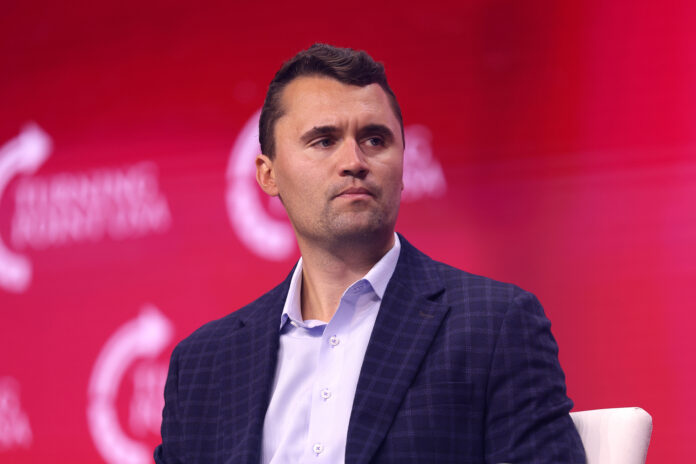
Charlie Kirk’s assassination unleashed not only predictable smears from his critics but also some of the most grotesque and dehumanizing responses imaginable toward an innocent man who left behind a wife and two young children. Among them were a taxpayer-funded Canadian social worker openly cheering his death, a professor at the University of Victoria gloating that he “got what he deserved,” a Canadian politician peddling malice, Oxford Union’s new president mocking the tragedy, and even a woman cackling with glee as if over a witch’s cauldron. These are not the reactions of principled opponents but of people who chose cruelty over compassion, spite over humanity.
But if you want to know who a man truly was, look not at the caricatures of his enemies but at the testimony of those who walked with him. Kirk was a husband, a father, a friend, and a believer who gave his life on the very battleground he chose: the campus stage. And in the hours after his death, it was not pundits but those closest to him who offered the clearest portrait of his character. His widow Erika put it simply: “The cries of this widow will echo around the world like a battle cry.” That cry, and the voices that joined it, cut through the noise of politics and revealed the man behind the headlines.
No testimony carried more weight than Erika Kirk’s. In her first public remarks, she spoke as a wife bound in covenant love. She described Charlie’s daily habit of asking how he could serve her and their children better. With quiet strength, she declared: “Two days ago, my husband Charlie went to see the face of his Saviour and his God… Now and for all eternity, he will stand at his Saviour’s side wearing the glorious crown of a martyr.”
Her most poignant words came not from a podium but from a mother’s explanation to her child. When their daughter asked where her father was, Erika told her: “Daddy is on a work trip with Jesus.” That simple act of faith transformed tragedy into witness. It revealed the heart of Kirk’s legacy: he was not only a public figure but a devoted husband and father who found joy in family life and bore suffering with hope.
Candace Owens, Kirk’s closest collaborator, described him not in the language of politics but of family: “There is no Candace without Charlie.” Together, they endured hundreds of flights, relentless mockery, and the exhaustion of building Turning Point USA from the ground up. Owens recalled that in their toughest days they laughed like siblings, and she spoke of a bond forged “in fire.” What struck her most was Kirk’s integrity. Unlike so many in the public eye and involved in politics, he never betrayed their friendship or their mission. He was visionary, optimistic, and utterly loyal. Her grief carried the same defiant note as Erika’s: though Kirk’s life was cut short, his voice would not die with him.
The testimonies extended well beyond his family and closest allies. Tucker Carlson highlighted that Kirk never allowed hatred into his heart, even when vilified. Robert F. Kennedy Jr., himself no conservative, called Kirk “the most eloquent truth teller of an era” and a “relentless crusader for free speech.” These cross-ideological tributes demonstrate that Kirk’s appeal was not simply partisan, but rooted in courage and conviction that spoke across divides.
Former U.S. Secretary of Housing and Urban Development neurosurgeon Dr. Ben Carson, together with his wife Candy, likewise testified to Kirk’s faith and integrity. “Rest in peace, Charlie. It was a privilege to call you a friend and to witness your unwavering faith and love for our country,” Carson wrote. Citing John 11:25, he reminded Americans that Kirk’s faith in Christ was not in vain: “Whoever believes in me, though he die, yet shall he live.” Carson called Kirk’s steadfast faith and patriotism a legacy that would inspire generations to come.
Fr. Chris Alar, MIC, also placed Kirk’s death in a spiritual context. Reflecting on the assassination, he warned that “when people quit talking, that’s when you get violence,” and praised Kirk for not merely preaching virtue but living it. Fr. Alar recalled that in one of his Explaining the Faith talks, he had shown a clip of Charlie Kirk speaking about faith. The reaction was immediate: “I got so much hate mail and I couldn’t understand it. I said, ‘I don’t even know who this guy is, but what he said was beautiful.’ Since then, I’ve learned who he is. What did he ever do that was so hateful other than stand up for Jesus and America? Jesus is the way, the truth, and the life. Yes, the truth is divisive. We know this. But Jesus never stopped speaking it because it was divisive.” For Alar, this crystallized the heart of Kirk’s legacy: courage to proclaim truth even when it invited hatred. Alar recalled Kirk’s own wish to be remembered for “the courage of my faith,” affirming that such courage was indeed his true legacy.
The clarity of these testimonies throws into sharper relief the blindness of others. Shortly after Kirk’s death, I spoke with my parish priest about what had happened. To my dismay, he admitted he had never even heard of Charlie Kirk. Instead, he reflexively blamed Donald Trump for fostering a climate of violence. I told him this was not only unjust but profoundly short-sighted. Kirk was a man who lived and died for truth, a husband and father whose courage should be honoured, not dismissed. While priests like Fr. Chris Alar understood that Kirk lived what he preached, too many within the Church remain blind to the cultural battle, parroting the talking points of mainstream media while ignoring the testimony of those who actually knew him. To his credit though, in our next meeting, he acknowledged that I was right; that Kirk was receiving a lot nasty hatred after doing a cursory search online.
What emerges from these testimonies is a man very different from the caricature of his critics. Erika revealed his covenantal love and his devotion as a father. Candace portrayed his loyalty, humour, and vision. Tucker, Carson, and RFK Jr. affirmed his courage and integrity. Fr. Chris Alar recognized his faith as lived reality. Each voice dismantles the false narrative that Kirk was defined by hatred or extremism. Charlie Kirk was slain while standing in defense of truth, freedom, and the created order: realities that ultimately transcend politics and point to something higher. In this sense, his life and death bore the mark of sacrifice. Like St. Paul’s image in 2 Timothy 4:6 of being “poured out like a drink offering,” Kirk spent himself for the sake of family, liberty, and the truth of human dignity. Whether or not one chooses the language of martyrdom, his death stands as a sobering reminder of the cost of witness in an age increasingly hostile to truth and to those who dare to speak it. They show instead a man whose defining marks were courage, loyalty, and faith. History will not remember the smears. It will remember the man who, even in death, multiplied his voice by refusing to surrender the truth.










